

These Videos Could Change How You Think About Teaching. Going to lunch with students changed Michael Wesch’s attitude about teaching, and he is trying to share his personal transformation through a series of videos he hopes will go viral.
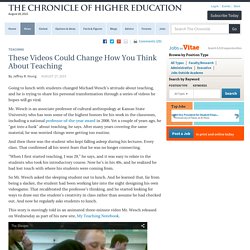
Mr. Wesch is an associate professor of cultural anthropology at Kansas State University who has won some of the highest honors for his work in the classroom, including a national professor-of-the-year award in 2008. Yet a couple of years ago, he "got into a funk" about teaching, he says. After many years covering the same material, he was worried things were getting too routine.
And then there was the student who kept falling asleep during his lectures. "When I first started teaching, I was 29," he says, and it was easy to relate to the students who took his introductory course. So Mr. This story is movingly told in an animated three-minute video Mr. If history is any guide, the videos will go viral.
“Teaching Is About Relationships” Gates Foundation Sponsored: Effective Teaching. Here Is A Good YouTube Tool for Teachers. This Is What Today’s Online Learning Content Tells Us About The Future Of School – Forbes. Home » News » This Is What Today’s Online Learning Content Tells Us About The Future Of School – Forbes learning – Google News.
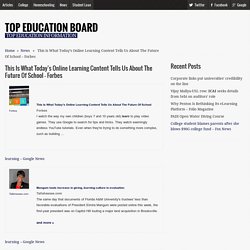
UbD-in-a-Nutshell.pdf. Dear Administrators, Can We Tear Down the Great Divide? Dear Administrators, I am not sure I am the right one to bring this up,in fact, I am not sure it is my place to start this conversation.

Yet, this blog has offered me a voice that not all teachers have, a place to start a public discussion that is needed. That doesn’t mean I am the best one to bring it up, but here goes nothing. There has always been a divide between administration and teachers it seems. From the poor jokes about going to the dark side to the hushed conversations behind closed doors discussing the latest admin “screw up,” it seems that there is an invisible mountain between teachers and administration that both sides don’t understand the origin of. So what is it that is creating it, and more importantly what can we do? Perhaps the divide has to to do with trust. Pearson Canada - John Hattie Papers.
Take a Risk and Find Your Voice as a Teacher. Last year, I boldly introduced Twitter to my class of Pre-Service Teachers.
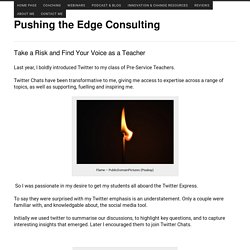
Twitter Chats have been transformative to me, giving me access to expertise across a range of topics, as well as supporting, fuelling and inspiring me. Flame – PublicDomainPictures (Pixabay) So I was passionate in my desire to get my students all aboard the Twitter Express. Close Reading: 5 Questions to Help Students Analyze Complex Texts. History of Teacher Education and Teacher Training. Home » Articles » History of Teacher Education and Teacher Training In Western European countries the teacher education began in the beginning of 18th century in Germany.
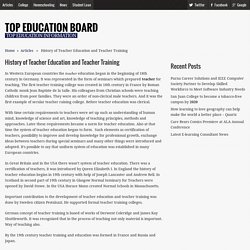
It was represented in the form of seminars which prepared teacher for teaching. The first teacher training college was created in 18th century in France by Roman Catholic monk Jean Baptiste de la Salle. His colleagues from Christian schools were teaching children from poor families. Top 25 Tech Tools for Teachers for 2015. 5 Rarely Considered Obstacles To 21st Century Education - Forbes. 5 Rarely Considered Obstacles To 21st Century Education. Carol Dweck says mindset is not ‘a tool to make children feel good’ The woman behind the theory of growth mindset says she is kept awake by some teachers misusing it to “make kids feel good about themselves”.
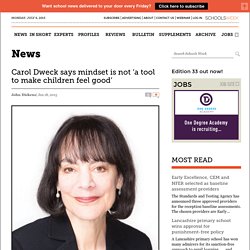
Psychologist Carol Dweck (pictured) devised the concept after decades of research on achievement and success. It explains how intelligence can be developed, so that children focus on improvement rather than worry about how smart they are. The buzz words of character and resilience are at the front of today’s education agenda and the idea has excited many with some schools developing “growth mindset” programmes. But Ms Dweck, professor of psychology at Stanford University, will tell the Festival of Education at Wellington College today that a culture of misuse is seeping into the sector. Teachers know best: What teachers and students want from EdTech. 10 reasons teachers do NOT use education technology. I often find myself in meetings about curriculum projects.
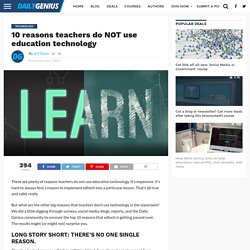
I am usually invited to either share my thoughts on the technology components or explain the technology options for tracking the curriculum. Sometimes the topic is sharing resources and making sure core documents can be managed and properly versioned. In all cases, I am required to have a broad overview of the K-12 curriculum. I am also required to have an understanding of the end-users and how they will apply the curriculum content to their various specialities. Aside from two or three other people, I generally find I have the most objective overview of how things are connected and the areas that need the most support. The problem is because I am working within the department of technology, my opinions of curriculum topics are often politely disregarded. All opinions aside concerning who may have the most objective outlook on curriculum, there is one fact that is nearly impossible to argue.
Head teachers: using neuroscience for education - The Long and Short Season 4. If introducing elements of gambling to school lessons makes some readers feel a bit uneasy, how about using small electrical currents to enhance pupils' mental faculties?
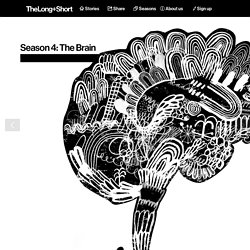
A growing number of enthusiasts are looking for DIY fixes to tune up their cognitive capabilities with home-made transcranial electric stimulation (tES, a group of non-invasive brain stimulation techniques that includes tDCS (Direct Current Stimulation) and tRNS (Random Noise Stimulation)). Even the sceptical Dorothy Bishop wonders whether tES is one area where neuroscience might one day find a useful niche in the classroom. It's certainly something psychologists wouldn't have tried without neuroscientists first laying the foundations.
Education Week. UserID: iCustID: IsLogged: false IsSiteLicense: false UserType: anonymous.
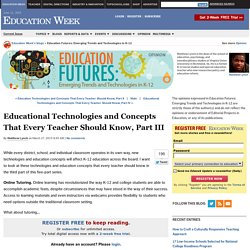
Special Needs Digest: Stanford Study on Brain Waves Shows How Different Teaching Methods Affect Reading Development. Beginning readers who focus on letter-sound relationships, or phonics, instead of trying to learn whole words, increase activity in the area of their brains best wired for reading, according to new Stanford research investigating how the brain responds to different types of reading instruction.

In other words, to develop reading skills, teaching students to sound out "C-A-T" sparks more optimal brain circuitry than instructing them to memorize the word "cat. " And, the study found, these teaching-induced differences show up even on future encounters with the word. The study, co-authored by Stanford Professor Bruce McCandliss of the Graduate School of Education and the Stanford Neuroscience Institute, provides some of the first evidence that a specific teaching strategy for reading has direct neural impact.
I am a Teacher, Not a Hero. Posted 05/11/2015 5:15PM | Last Commented 06/05/2015 4:38AM Yes, I am a teacher. No, I am not a hero. I am not a martyr. The Reading Strategies Book by Jen Serravallo. A Very Brief Introduction to Principles, Research, and Theory, and How to Use This Book. How to Calculate Social Media ROI: A Delightfully Short Guide. If the concept of social media ROI feels rather enormous, you’re not alone. I am amazed—and sometimes astounded—at the breadth of the topic. So that’s made the exercise of writing a “delightfully short” guide to social media ROI all the more fun and challenging. Chasing Down the Elusive Credits for Facts and Fictions in Learning and Improvement. 13 Ways to Be an Exceptional Teacher 5 Ways to Become a Fantastic Teacher.
'Why teachers should become consumers of curricula and lessons planned and designed by others' 52 Ways to Make a Colleague's Day: The Teach Kindness Project. We are proud to share Brilliant or Insane senior writer Angela Stockman’s new book, The Teach Kindness Project, with you today. A Quiver of Teaching Strategies (Not Just One Silver Bullet) OK, so let's say you're an archer. Put aside our myths of Robin Hood, William Tell, and Oliver Queen for a moment. Learning Leading Change: EduTECH Day One: Open Schools for globally connected learning. David Price is the author of the fabulous book Open and Larry Rosenstock is the director of High a Tech High.
Welcome to Forbes. The 18 Most Influential People in Ed Tech. Brick-and-mortar schools may be on vacation by now, but ed tech never sleeps: the education website Noodle recently compiled a list of the 18 most influential people in ed tech, and you can bet they’ll be working this summer. The list is part of a larger collection of 67 influential educators, which also includes influencers in education analysis, higher education, and K-12 education. Defining "Best Practice" in Teaching. It's often said in the teaching world (as in many professions and trades, I imagine), "Why reinvent the wheel when there are plenty of practices that already work?
" Confessions of a Teacher Who Doesn't Believe In Education Resources on Engaging Student Voices. 30 Habits Of Highly Effective Teachers. Welcome to Forbes. Transform Teaching and Learning with Digital Tools. Using Multimedia to Power Up Classroom Magazines on Flipboard. QUESTIONS: What is Wrong with Education. Google Drive from an educators perspective - iSupport. No Student Is Unreachable.
Refuse To Be A Boring Teacher. Are Traditional Teachers Obsolete? - Walt Gardner's Reality Check. The Importance of Teaching Through Relationships. Across the Gulf - Remembering Technology Integration. A Useful Framework For Transparency In Education. Edutopia. Engaging Students: Online and Offline All You Need to Know About the 'Learning Styles' Myth, in Two Minutes. What Comes First: the Curriculum or the Technology? No Excuses?
25 Teaching Tools To Organize, Innovate, & Manage Your Classroom. Gifted and Talented Programs Dumb Down Our Students. TeachThought - Learn better. Why technology will never replace teachers. Technology in schools: Future changes in classrooms. Preschool lessons: New research shows that teaching kids more and more, at ever-younger ages, may backfire. Enhancing Education Through Technology (EETT): Supporting teachers in creating Future Ready classrooms. A Taxonomy Tree: A Bloom's Revised Taxonomy Graphic. The Flow Theory In The Classroom: A Primer. Critically Examining What You Teach. S Guide to the Flipped Classroom for 2014. 15 Mistakes New Teachers Make (and what I learned making them) Many, Many Examples Of Essential Questions. Everything Teachers Need to Know about Google Classroom. Create your own Adventure Time game in this great iOS app. Awesome Visual Featuring The 6 Types of Technology Integrators. Crosswords, Puzzles, and Online Games - The Washington Post - The Washington Post.
80+ Google Forms for the Classroom. Kids Who Spend All Day at School. 33 Activities Under $10 That Will Keep Your Kids Busy All Summer. Teaching versus Learning. 5 Online Tools to Help Combat Plagiarism. Just-in-Time Teaching: Harnessing the Power of Google Forms. Edudemic - Education Technology Tips For Students And Teachers. Your Face Scares Me: Understanding the Hyperrational Adolescent Brain. Next Generation Learning; Today...
Educational Technology in Canada: A Parent's POV. What have you got against engaging lessons? Twitter, Instagram, and Pinterest in the Classroom. 10 Iconic Teacher Actions That Technology Should Disrupt - How the Kids Do It Now: School. Flexible Learning Paths by Susan Oxnevad. Create Digital Portfolio on iPad Using Google Drive. The Real Reason New College Grads Can’t Get Hired. Classroom Guide: Top Ten Tips for Assessing Project-Based Learning (now available in Spanish!) 21st Century Learning requires a differentiated... 7 Ways to Increase Student Engagement in the Classroom Infographic. 10 Ways Data Can Sabotage Your Teaching. Why Your Teaching Style Might Be A Bad Match For Your Students. How are you thinking about the “package” we call “school?” #MVIFI.
English. Social sciences. Lectures Aren't Just Boring, They're Ineffective, Too, Study Finds. Great Teaching: What A Messy, Successful School Year Looks Like. An Open Letter of Hope to Teacher Leaders - Learning Forward's PD Watch.